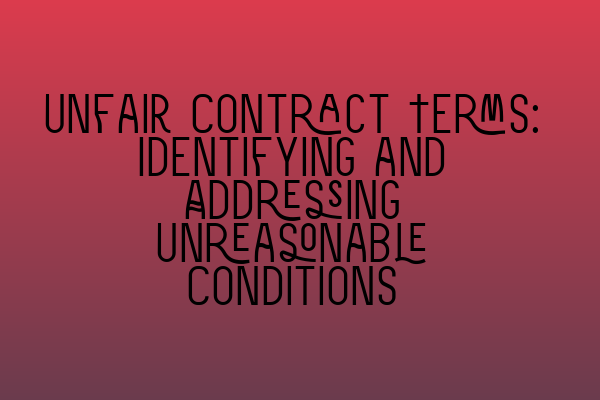Unfair Contract Terms: Identifying and Addressing Unreasonable Conditions
In the world of contract law, fairness is a fundamental principle. Contracts are meant to protect the interests of all parties involved and ensure that each party receives what they are entitled to. However, there are instances where one party may include unfair contract terms that give them an unfair advantage or unfairly limit the rights of the other party.
Identifying these unfair contract terms is crucial to ensuring that contracts are fair and equitable. This article will explore how to recognize and address such unreasonable conditions in legal contracts.
1. Understanding Unfair Contract Terms
Unfair contract terms are provisions that give one party an unfair advantage or excessively limit the rights and remedies available to the other party. These terms can be found in a wide range of contracts, including consumer contracts, commercial agreements, and employment contracts.
Examples of unfair contract terms include:
– Excessive penalties or liquidated damages clauses that are disproportionate to the potential harm caused by a breach of contract.
– Unilateral rights to terminate or modify the contract without valid reasons or notice periods.
– Unconscionable clauses that take advantage of a party’s vulnerable position or lack of bargaining power.
– Exclusion or limitation clauses that seek to exclude or limit liability for negligence or breach of statutory duty.
2. Recognizing Unfair Contract Terms
Identifying unfair contract terms requires a careful analysis of the contract provisions. Here are some key factors to consider:
– Examine the overall balance of rights and obligations in the contract. Are certain clauses heavily biased in favor of one party? Do they restrict the other party’s rights excessively?
– Pay attention to any clauses that attempt to exclude or limit liability for essential obligations or breach of statutory duty.
– Assess the clarity and transparency of the contract terms. Are they written in plain and understandable language? Are any important terms hidden or buried in the fine print?
3. Addressing Unreasonable Conditions
If you come across unfair contract terms, there are several steps you can take to address and rectify the situation:
– Negotiate: Discuss your concerns with the other party and try to negotiate for fair and reasonable contract terms. Make sure to highlight the specific clauses you find unreasonable and propose alternative language that better protects your rights and interests.
– Seek Legal Advice: If negotiations fail, consult with a solicitor experienced in contract law. They can review the contract and provide guidance on whether the unfair terms are unenforceable or illegal under applicable legislation. They can also advise you on potential legal remedies available to you.
– Raise a Complaint: If you believe that the contract terms are unfairly biased or misleading, consider submitting a complaint to the relevant regulatory body or ombudsman. They can investigate the matter and take appropriate action to rectify the situation.
– Take Legal Action: In extreme cases, where the unfair contract terms have caused significant harm or loss, you may need to take legal action. A solicitor can provide you with the best course of action and guide you through the legal process.
Conclusion
Identifying and addressing unfair contract terms is crucial to protecting your rights and ensuring fair treatment in contractual relationships. By understanding what constitutes an unfair contract term and taking appropriate steps to address them, you can strive for fair and equitable outcomes.
At SQE Contract Law, we understand the importance of fair contractual relationships. We offer comprehensive courses to prepare you for the SQE 1 and SQE 2 exams, helping you build a strong foundation in contract law. If you’re looking to enhance your legal knowledge and exam skills, check out our SQE 1 Preparation Courses and SQE 2 Preparation Courses.
Remember, fairness is key in contracts, and it’s important to be vigilant about identifying and addressing unfair terms. By doing so, you contribute to a more equitable and just legal landscape.
Related Articles:
– Follow this link to access SQE 1 Practice Exam Questions for comprehensive practice and assessment.
– Enhance your exam preparation with SQE 1 Practice Mocks FLK1 FLK2. Check it out!
– Need help with SQE 2 exam preparation? Our SQE 2 Preparation Courses are designed to equip you with the skills and knowledge you need to succeed.
– Prepare for the SQE 1 exam with our comprehensive SQE 1 Preparation Courses. Get started now!
– Stay updated with the latest SRA SQE Exam Dates to plan your preparation effectively.
